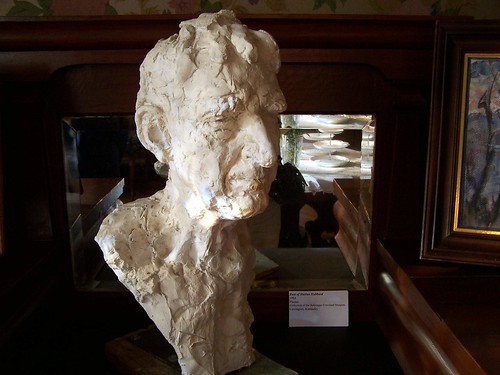Shanty Boat excerpt
An excerpt from Harlan Hubbard's Shantyboat, A River Way of Life, published 1977 by University Press of Kentucky.
Before the Hubbards stopped at Payne Hollow to create their little home, they made a long slow trip down the Ohio to the Mississippi and down the Mississippi to the Gulf. Here, Harlan explains their reasoning...
There were other and deeper reasons for my going down to the river. I thought I might be able to engage there in certain harmless and simple activities which town, and even country, interfered with. For where can one find more freedom than on the river? The fields and woods are all owned by someone, and beyond the narrow bounds of the public road the walker is trespassing. I do not say the river is entirely outside the law, although we have been told of certain sections that are, but it affords a chance for a more unhampered life than any other accessible region.
I had no theories to prove. I merely wanted to try living by my own hands, independent as far as possible from a system of division of labor in which the participant loses most of the pleasure of making and growing things for himself. I wanted to bring in my own fuel and smell its sweet smoke as it burned on the hearth I had made. I wanted to grow my own food, catch it in the river, or forage after it. In short, I wanted to do as much as I could for myself, because I had already realized from partial experience the inexpressible joy of doing so.
Before the Hubbards stopped at Payne Hollow to create their little home, they made a long slow trip down the Ohio to the Mississippi and down the Mississippi to the Gulf. Here, Harlan explains their reasoning...
There were other and deeper reasons for my going down to the river. I thought I might be able to engage there in certain harmless and simple activities which town, and even country, interfered with. For where can one find more freedom than on the river? The fields and woods are all owned by someone, and beyond the narrow bounds of the public road the walker is trespassing. I do not say the river is entirely outside the law, although we have been told of certain sections that are, but it affords a chance for a more unhampered life than any other accessible region.
I had no theories to prove. I merely wanted to try living by my own hands, independent as far as possible from a system of division of labor in which the participant loses most of the pleasure of making and growing things for himself. I wanted to bring in my own fuel and smell its sweet smoke as it burned on the hearth I had made. I wanted to grow my own food, catch it in the river, or forage after it. In short, I wanted to do as much as I could for myself, because I had already realized from partial experience the inexpressible joy of doing so.


0 Comments:
Post a Comment
<< Home